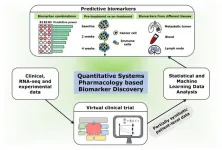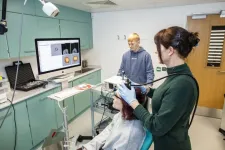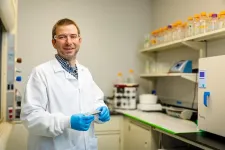(Press-News.org) Most patients may continue to safely take glucagon-like peptide-1 (GLP-1) receptor agonists as prescribed before undergoing elective surgery and gastrointestinal endoscopies, according to new clinical guidance released today by five surgical and medical societies including the American Society for Metabolic and Bariatric Surgery (ASMBS), American Society of Anesthesiologists (ASA), American Gastroenterological Association (AGA), International Society of Perioperative Care of Patients with Obesity (ISPCOP), and Society of American Gastrointestinal and Endoscopic Surgeons (SAGES).
The guidance, published online in Surgery for Obesity and Related Diseases (SOARD), Surgical Endoscopy, and Clinical Gastroenterology and Hepatology, however cautioned that patients at high risk for significant gastrointestinal side effects should follow a liquid diet for 24 hours before a procedure and the anesthesia plan be adjusted accordingly. In rare cases, the procedure should be delayed.
GLP-1s, used to treat obesity, diabetes and heart problems, delay gastric emptying, and residual food or liquid in the stomach at the time of surgery with general anesthesia, may increase the risk for serious complications including aspiration. On the other hand, withholding medication so patients can have surgery may be even riskier, prompting the new guidance. It is also important to note that the risk of delayed gastric emptying decreases over time for most patients on these medications.
“Our goal is to heighten awareness of a potential safety issue to prevent it,” said Ann M. Rogers, MD, President, ASMBS, the largest society for metabolic and bariatric surgeons in the United States. “In most cases, patients can continue to take the drugs, however, individual risk factors for complications should be assessed prior to surgery before moving forward.”
The authors wrote, “the purpose of this clinical practice guide is to offer unified, multi-society guidance for safely managing patients needing GLP-1RA therapy regardless of indication, which currently includes type 2 diabetes, overweight and obesity, and heart failure, during the periprocedural period.”
Full guidance is published in SOARD, Clinical Gastroenterology and Hepatology and Surgical Endoscopy.
About AGA
The American Gastroenterological Association is the trusted voice of the GI community. Founded in 1897, the AGA has grown to more than 16,000 members from around the globe who are involved in all aspects of the science, practice and advancement of gastroenterology. The AGA Institute administers the practice, research and educational programs of the organization. www.gastro.org.
About ASMBS
The ASMBS is the largest organization for bariatric surgeons in the United States. It is a non-profit that works to advance the art and science of bariatric surgery and is committed to educating medical professionals and the lay public about bariatric surgery as an option for the treatment of severe obesity, as well as the associated risks and benefits. It encourages its members to investigate and discover new advances in bariatric surgery, while maintaining a steady exchange of experiences and ideas that may lead to improved surgical outcomes for patients with severe obesity. For more information, visit www.asmbs.org.
END
Most patients can continue GLP-1 anti-obesity drugs before surgery
New multi-specialty guidance from surgeons, anesthesiologists, and gastroenterologists provides clarity on usage
2024-10-29
ELSE PRESS RELEASES FROM THIS DATE:
Computational tool developed to predict immunotherapy outcomes for patients with metastatic breast cancer
2024-10-29
FOR IMMEDIATE RELEASE
Using computational tools, researchers from the Johns Hopkins Kimmel Cancer Center and the Johns Hopkins University School of Medicine have developed a method to assess which patients with metastatic triple-negative breast cancer could benefit from immunotherapy. The work by computational scientists and clinicians was published Oct. 28 in the Proceedings of the National Academy of Sciences.
Immunotherapy is used to try to boost the body’s own immune system to attack cancer cells. However, only some patients respond to treatment, explains lead study author Theinmozhi Arulraj, Ph.D., a postdoctoral fellow at Johns Hopkins: “It’s really important ...
Cerebral embolic protection by geographic region
2024-10-29
About The Study: The PROTECTED transcatheter aortic valve replacement (TAVR) trial could not show that the use of cerebral embolic protection (CEP) had a significant effect on the incidence of periprocedural stroke during TAVR. Although there was no significant interaction by geographic region, this exploratory post hoc analysis suggests a trend toward greater stroke reduction in the U.S. cohort but not in the outside the U.S. cohort. These findings are hypothesis generating, and further research is needed to determine if regional differences in patient characteristics or procedural practices ...
12 new Oriental weevil species discovered using advanced imaging tools
2024-10-29
Jake Lewis, an entomologist in the Environmental Science and Informatics Section at the Okinawa Institute of Science and Technology (OIST), is fascinated by weevils, a diverse group of beetles that includes many species with elephant trunk-like mouthparts (called a rostrum). Weevils provide various ecosystem services such as pollination and decomposition, but some species are serious pests known to decimate crop fields and timber forests.
Using x-ray microtomography, a 3D imaging technique ...
Ultrasound can be used as search and rescue tool for the brain
2024-10-29
Ultrasound, once used almost exclusively to take images of the body, is quickly developing into a targeted therapy that can have a potentially life-changing impact on our brains, according to the authors of a new article.
For decades, health professionals across the world have used ultrasound as a means of monitoring the development of unborn babies and assessing the health of patients’ internal organs.
But writing in the journal PLOS Biology, researchers from Stanford University, the University of Plymouth, and Attune Neurosciences say it has now been demonstrated to offer a non-invasive and precise way of targeting ...
Department of Defense funds study of gene therapy for muscular degeneration
2024-10-29
The U.S. Department of Defense awarded just under $514,000 to an interdisciplinary team of researchers at the U of A to study the efficacy of “self-delivering” gene editors in the treatment of Duchenne Muscular Dystrophy, or DMD.
DMD results from a mutation in the dystrophin gene and is one of the most severe inherited muscular dystrophies, leading to deterioration of the muscle fibers. Presently, there is no cure, but advances in treatment have helped patients live longer, better lives.
Gene therapy designed to ...
People’s exposure to toxic chemicals declined in the U.S. following listing under California law
2024-10-29
With growing concern about the ubiquity of toxic chemicals in consumer products, many states have passed laws aimed at protecting people from harmful substances in everyday items like cosmetics, cleaning supplies, plastics, and food packaging. California’s Proposition 65, for instance, is considered one of the most extensive toxics laws in the country.
But does the law work? According to a new study published in the journal Environmental Health Perspectives, it does.
“Not only have people’s exposures to specific toxic chemicals gone down in California, ...
Trauma, homelessness afflict gender affirming care patients at higher rates
2024-10-29
A survey of patients receiving gender affirming care shows that commercial insurance pays for most of their treatments, they receive less care in the South than other parts of the U.S. and they deal with disproportionate levels of housing insecurity and trauma compared to others, according to a new study by researchers at the Colorado School of Public Health and the University of Colorado Anschutz Medical Campus.
The study, using data provided by Kythera Labs, a healthcare clearinghouse, examined millions of insurance claims by patients undergoing gender affirming care (GA) and those not. It also looked at social determinants of healthcare (SDOH), non-medical factors ...
New $5 million DoE award supports KU startup’s green hydrogen energy research
2024-10-29
LAWRENCE — With $5 million in support from the U.S. Department of Energy, the University of Kansas and Avium — a startup firm founded by researchers from KU’s School of Engineering — aim to make clean hydrogen more affordable.
According to the DoE, the work at KU is part of $750 million in funding for 52 projects across 24 states “to dramatically reduce the cost of clean hydrogen and reinforce American leadership in the growing hydrogen industry.”
Green hydrogen is a key tool in the worldwide ...
A navigation system for microswimmers
2024-10-29
Microswimmers often need to independently navigate narrow environments like microchannels through porous media or blood vessels. The swimmers can be of biological origin, like algae or bacteria, but also constitute custom designed structures used for the transport of chemicals and drugs. In these cases, it is important to control how they swim in relation to walls and boundaries - as one might want them to exchange fuel or information, but also avoid them to stick where they are not supposed to.
Many swimmers are electrically ...
Study finds early TAVR can be beneficial for patients with asymptomatic severe aortic stenosis
2024-10-29
WASHINGTON, DC – OCTOBER 28, 2024 – The first powered randomized trial examining early intervention with transcatheter aortic valve replacement (TAVR) in patients with asymptomatic, severe aortic stenosis (AS) found this strategy to be both a safe and effective alternative to clinical surveillance (CS).
Findings were reported today at TCT 2024, the annual scientific symposium of the Cardiovascular Research Foundation (CRF). TCT is the world’s premier educational meeting specializing in interventional ...
LAST 30 PRESS RELEASES:
Scientists discover why we know when to stop scratching an itch
A hidden reason inner ear cells die – and what it means for preventing hearing loss
Researchers discover how tuberculosis bacteria use a “stealth” mechanism to evade the immune system
New microscopy technique lets scientists see cells in unprecedented detail and color
Sometimes less is more: Scientists rethink how to pack medicine into tiny delivery capsules
Scientists build low-cost microscope to study living cells in zero gravity
The Biophysical Journal names Denis V. Titov the 2025 Paper of the Year-Early Career Investigator awardee
Scientists show how your body senses cold—and why menthol feels cool
Scientists deliver new molecule for getting DNA into cells
Study reveals insights about brain regions linked to OCD, informing potential treatments
Does ocean saltiness influence El Niño?
2026 Young Investigators: ONR celebrates new talent tackling warfighter challenges
Genetics help explain who gets the ‘telltale tingle’ from music, art and literature
Many Americans misunderstand medical aid in dying laws
Researchers publish landmark infectious disease study in ‘Science’
New NSF award supports innovative role-playing game approach to strengthening research security in academia
Kumar named to ACMA Emerging Leaders Program for 2026
AI language models could transform aquatic environmental risk assessment
New isotope tools reveal hidden pathways reshaping the global nitrogen cycle
Study reveals how antibiotic structure controls removal from water using biochar
Why chronic pain lasts longer in women: Immune cells offer clues
Toxic exposure creates epigenetic disease risk over 20 generations
More time spent on social media linked to steroid use intentions among boys and men
New study suggests a “kick it while it’s down” approach to cancer treatment could improve cure rates
Milken Institute, Ann Theodore Foundation launch new grant to support clinical trial for potential sarcoidosis treatment
New strategies boost effectiveness of CAR-NK therapy against cancer
Study: Adolescent cannabis use linked to doubling risk of psychotic and bipolar disorders
Invisible harms: drug-related deaths spike after hurricanes and tropical storms
Adolescent cannabis use and risk of psychotic, bipolar, depressive, and anxiety disorders
Anxiety, depression, and care barriers in adults with intellectual and developmental disabilities
[Press-News.org] Most patients can continue GLP-1 anti-obesity drugs before surgeryNew multi-specialty guidance from surgeons, anesthesiologists, and gastroenterologists provides clarity on usage





